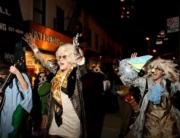
Brett Story’s musing mosaic of everyday New Yorkers attempts to paint the city in all its diversity, honing in on the lives of its inhabitants and their sentiments toward the future in the wake of climate change and the seeming decay of late-stage capitalism. The film follows middle-aged couples and union men on Staten Island; bougie jazz fans playing Roaring ’20s dress-up in gentrified Brooklyn; house cleaners, bus drivers, and broke college grads relaxing on the Coney Island beach; Crown Heights youth enjoying their last days of summer 2017; and more.
The list of those Story documents are indeed vast, though not vast enough considering that, for example, few Asians appear in a city with a large Asian population. Nevertheless, Story’s attempt to capture the “collective consciousness” of America’s largest metropolitan is occasionally mildly interesting. My own attention was most held when she talks to working- and middle-class whites on Staten Island and hearing all the cringeworthy hints at how uncomfortable they feel about the increasing rise of “ethnics” in their neighborhood. “We’re not racist but…” is all one needs to know.
The Hottest August jumps from one person to the next, with occasional interludes of narration that is supposed to connect to the broader themes of social and environmental decay, as well as the impending collapse of capitalism. There are also occasional shots of TVs broadcasting the latest tragedy (such as the white supremacist killing of Heather Heyer in Charlottesville, Virginia). Story tries to reel from her subjects their thoughts on various issues from climate change, wealth inequality, race, class, and poverty, eliciting answers that range from hopelessness to helplessness.
It’s easy to see what Story is trying to get at here, but it’s a mystery as to why she chose to express it in such a nebulous, half-baked way. The film often seems like the director bites off more than she can chew, and much of the flow feels utterly forced and devoid of novel substance. Long meandering shots of the sky can be absolutely draining, and many of the people she profiles really aren’t too compelling, making the film feel like its emphasizing quantity over quality. By the halfway point, it was as if hours had passed.
For those interested in experimental documentaries or visual poetry, The Hottest August could provide some inspiration. Some of the sound work is impeccable—distorted radio signals are scattered throughout some of the monotonous still shots, as if all connection is being drowned in a flurry of unseen chaos—and this evokes an eerie wave of ominous apprehension.
Yet, a film that tries to depict the chaotic and foreboding by being just chaotic and foreboding often ends up saying nothing at all. It ultimately engages in a tiring “end is nigh” fatalism that is becoming a sort of genre itself these days. Hence, those looking for a coherent story with a clear point of view may find The Hottest August unnecessarily cold.






Leave A Comment